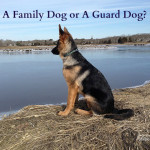10 Signs of Cancer in Dogs
Are You Able to Spot the Early Warning Signs of Cancer in Your Dog?
It’s every owner’s worst fear - your dog is getting on in years and slowing down. You’ve heard stories or perhaps had other pets that were diagnosed with cancer. Of course, with regular check-ups, your vet will help identify any concerns he or she might have but in the back of your mind, you start to wonder.
Some herding dog breeds, such as German Shepherds and Border Collies, are prone to cancer. In fact, cancer is leading cause of death in Border Collies with 23.6% of them dying from cancer. While German Shepherds are prone to many different types of cancers, they are most commonly afflicted with hemangiosarcoma.
Unfortunately, we can’t prevent our dogs from getting cancer, but we can educate ourselves about early warning signs and just as with humans, early detection is key. Here are 10 warning signs:
Your Dog Seems To Be In Pain
Limping or other evidence of your dog in pain when he or she is active, or if the pain is too great for them to be active, can be indications of cancer of the bone.
Offensive Bodily Odors
Foul odors from any of your dog's orifices and/or body parts may be a cause for concern. Cancers of the mouth, nose, or anal regions can cause your pet to emit offensive odors.
Lumps, Swelling, Bulges, Bumps
Not every lump or bump is necessarily cancerous, but consulting with your vet is the only way to be sure. If the lump is growing or not resolving itself, contact your vet and he or she will do a biopsy to determine the contents of the bump.
Sluggishness
If your pet has cancer, there is a chance that he or she will suffer from depression and sleep more, become less playful, and be less willing to go for walks. Although lethargy or depression in dogs can set in with a number of different illnesses, it is commonly seen in pets that have cancer.
Changes in Potty Habits
Any changes in your dog's potty habits including difficulty or frequent urinating or defecating, and blood in urine or stools can be potential warning signs that cancer has developed in your pet.
Peculiar Bodily Discharge
Discharges such as blood, pus, vomit, diarrhea, and any other abnormal substance being excreted from your dog body should be checked out by a veterinarian immediately. A bloated or distended stomach could also be a sign of internal discharge.
Sudden Weight Loss
Sudden weight loss in dogs not on a diet can be an indicator of many diseases and illnesses. If coupled with another warning sign of cancer, you should contact your vet right away and inform him or her about your pet's symptoms.
Loss of Appetite
While a lack of appetite in dogs can be a sign of many things, they usually never stop eating fully without a cause. A decrease in appetite can indicate an oral tumor, which would make it painful and difficult for your pet to eat and swallow, or even an intestinal cancer or blockage due to a tumor. In such cases, it's important to consult with a veterinarian who can assess your dog's condition and, if necessary, recommend a dog appetite stimulant to help improve their food intake and overall well-being.
Wounds That Do Not Heal
Lacerations or sores that do not heal within a normal time range on the surface of your dog's body may suggest infection, skin disease and possibly cancer.
Coughing/Difficulty Breathing
Although symptoms of heart and lung disease, coughing and abnormal breathing can also indicate cancer. This symptom will most likely occur if the cancer in your dog's body has metastasized into his or her lungs.
Of course, if your dog just does not seem right, it’s worth taking him/her in for a vet visit. You know your dog best so when something is not right, you will most likely be the first to know. Regular veterinary care will help catch signs of cancer early on when the chances of recovery are most high.
Article By:
Danielle Sullivan






